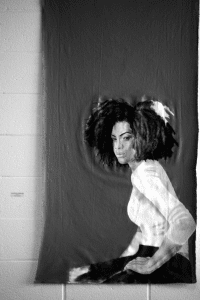On Thursday, Mar. 23, in the Lumpkin Learning Commons, artist Derek Patterson presented an exhibit of his latest works, collectively entitled “Identity.” A native of Dayton, Ohio, Patterson utilizes his artistic abilities to initiate conversation on racial issues. He graduated from Kentucky State University in 2016 with a bachelor’s degree in studio art and is currently enrolled in the graduate program at Southern Illinois University Edwardsville.

Patterson’s work generates conversation about race
Patterson began the exhibition by explaining that the collective purpose of his artwork represents “how I feel as a black student from the inner city.” He then spoke briefly about personal experiences that inspired him to create his recent collection. He elaborated on the back stories of an image entitled “Color Blind” and another titled “I Don’t See Color” that were portraits of his seven-year-old son. Patterson added that the intention of his works was to “present them in a way where it creates conversation.”
Afterwards he encouraged the audience to interact and ask questions about his artwork. While most questions surrounded the meanings of particular pieces and his approach to art, Patterson noticed a peculiarity among the students in the audience. They were segregated. He bluntly pointed out the division of the room and asked white students why they weren’t asking any questions. A moment of dead silence fell over the audience. Sophomore psychology major Tyla Ross described it as “a beautiful eye-opener. I mean, this is something that happens every day. And it’s amazing how an outsider who observed it, brought it out.”
After the silence cleared and he finished the conversation with the audience, Patterson reflected on that moment. “It was kind of disheartening that it was segregated,” he stated. “I think it just reinforced my idea (that) nothing will ever change if we constantly have this fear.” Tyla Ross related to Patterson’s message and said, “It really shows a good message about how us as black people feel about certain things.”
In consideration of current racial issues in the U.S., Patterson stated, “You know, my dad’s dad’s dad has been fighting this [issue]. Do I hope there will be a change?” he questioned before an apprehensive reply, “Yeah. But I think it will be a forced change.”

